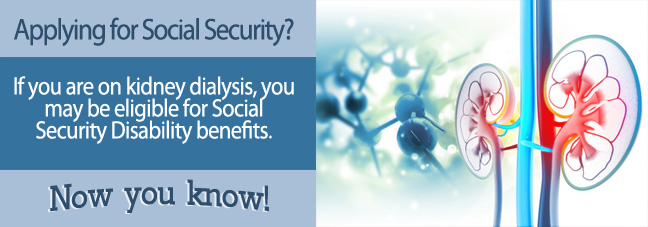Dialysis is a medical procedure that helps the kidneys restore some or most of their original functions. Receiving dialysis treatment does not automatically qualify you for Social Security disability benefits.
The seriousness of kidney disease is what determines whether you can forgo the standard disability application process and receive fast-track approval for financial assistance. If you qualify for fast-track approval of disability benefits, it is because you meet the criteria established for the Compassionate Allowance Program.
Some patients continue wort work full-time as they go through treatment, while others transition to part-time work in another position.
How to Qualify Automatically for Disability Benefits
The Social Security disability claim process can be frustrating due to the considerable time it takes to process claims. If you suffer from a debilitating illness or injury, you might qualify for fast-track approval of financial assistance.
Compassionate Allowance represents a program that expedites the process of receiving disability benefits. Many of the medical conditions listed for the Compassionate Allowance program are considered rare diseases, while some medical conditions are not considered rare, but they can develop life-threatening symptoms.
The list of qualifying diseases for the Compassionate Allowance Program includes several forms of cancer, as well as neurodegenerative diseases. Every medical condition listed in the Compassionate Allowance Program is extremely difficult to manage.
To become eligible for the Compassionate Allowance Program, you must present persuasive medical evidence, such as the results of diagnostic tests and a detailed description of each treatment program you have completed. For example, if you suffer from a form of cancer, you need to submit documents that describe how far the tumors have spread, as well as x-rays that show a progression in the development of the disease.
Working with a Social Security disability attorney or a disability advocate can improve the strength of your Compassionate Allowance application.
Does Dialysis Automatically Qualify for Disability Benefits?
Dialysis is a type of treatment that mimics some or most of the functions of healthy kidneys. Most kidney disease patients do not have to be hooked up to a dialysis machine throughout each day. To qualify for the Compassionate Allowance Program, you must demonstrate to the Social Security Administration (SSA) that the symptoms of your kidney disease have turned life-threatening.
Simply receiving dialysis treatment is not a strong enough reason to qualify for the Compassionate Allowance Program.
Receiving disability benefits largely depends on how a disease limits the amount of time you can work. If dialysis treatment makes it impossible to leave home, then you might qualify for disability benefits by going through the standard claim process.
Many patients on dialysis suffer from serious kidney disease that produces symptoms like nausea, acute fatigue, and swelling in the arms and legs. Submitting medical records that prove the existence of serious kidney disease symptoms is how you might qualify for disability benefits.
Get Help with Your Claim
The SSA has established strict guidelines for applicants to qualify for the Compassionate Allowance Program. You must suffer from debilitating symptoms that dramatically alter your life or you have received a diagnosis for a terminal illness. Dialysis treatment itself does not qualify you for fast-track approval for benefits, but living with kidney disease might get you fast-tracked for financial assistance.
Schedule a free case evaluation today to determine whether dialysis treatment automatically qualifies you to receive Social Security disability benefits.

